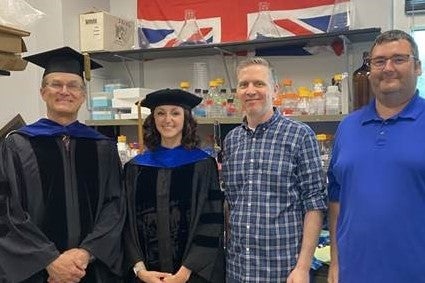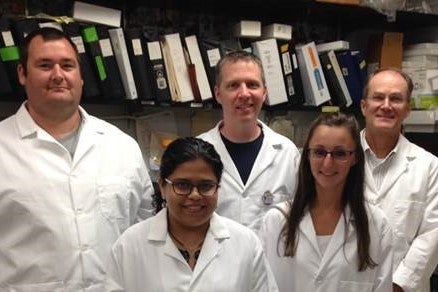Everett C. Pesci

Professor and Chair
BS, Indiana University of Pennsylvania
MS, Indiana University of Pennsylvania
PhD, University of Kentucky
Phone: 252-744-2351
Fax: 252-744-3104
Email: pescie@ecu.edu
Research
My research interests have always centered on bacterial pathogenesis. I completed my M.S. degree at Indiana University of Pennsylvania studying Legionella pneumophila, the causative agent of Legionnaires’ Disease, and earned my Ph.D. at the University of Kentucky while studying Campylobacter jejuni and Helicobacter pylori, which cause food-borne gastroenteritis and stomach inflammation/ulcers, respectively. As a postdoctoral fellow at the University of Rochester, I began studying Pseudomonas aeruginosa, a Gram negative bacterium that is one of the leading sources of infections acquired by hospitalized patients, causing ailments such as pneumonia, and urinary tract and surgical wound infections. P. aeruginosa also infects most cystic fibrosis patients at a very early age and causes a chronic pneumonia that is virtually impossible to cure. In addition, this opportunistic pathogen is a regular source of corneal keratitis in contact lens wearers, with serious infections leading to blindness. Our research on P. aeruginosa is focused on how this pathogen controls its virulence through cell to cell signals. P. aeruginosa uses at least three small chemicals to communicate intracellularly and regulate a large number of virulence factors and other cellular functions. This regulation is dependent on the density of the bacterial cells and in this manner, P. aeruginosa monitors and responds to its own population. We speculate that P. aeruginosa benefits from this regulation by delaying virulence factor expression until enough bacteria are present to overcome the immune response that will be elicited by the presence of certain virulence factors. My laboratory has identified a novel intracellular signal, 2-heptyl-3-hydroxy-4-quinolone, and refer to it as the Pseudomonas Quinolone Signal (PQS). This signal controls numerous virulence factors and is required for P. aeruginosa to cause infections in plants, insects, and animals. We have also directly found this signal in the sputum of cystic fibrosis patients, which suggests that it plays a role in chronic lung infections. Our studies have focused on understanding the synthesis of PQS and how this synthesis is regulated. We have discovered that at least 5 operons are involved in PQS synthesis and have undertaken studies to identify key enzymes involved in PQS synthesis. We are also examining the activity of PQS and how it regulates genes which it controls. Our long term goal is to identify aspects of PQS-signaling that can be exploited for drug targeting. While such targets would probably not produce a bactericidal compound, they could produce a therapeutic agent that will disrupt the PQS signaling cascade and thereby lessen the virulence of P. aeruginosa. Such compounds could augment known antibiotics or make the bacterium more susceptible to clearance by the host immune system.
If you are interested in joining our laboratory or have any questions for me, please contact me at 252-744-2351 or pescie@ecu.edu.
Staff
| Name | Title | Location | Phone | |
|---|---|---|---|---|
 | Wells, Greg | Research Specialist | Biotech 127 | 252-744-2358 |

